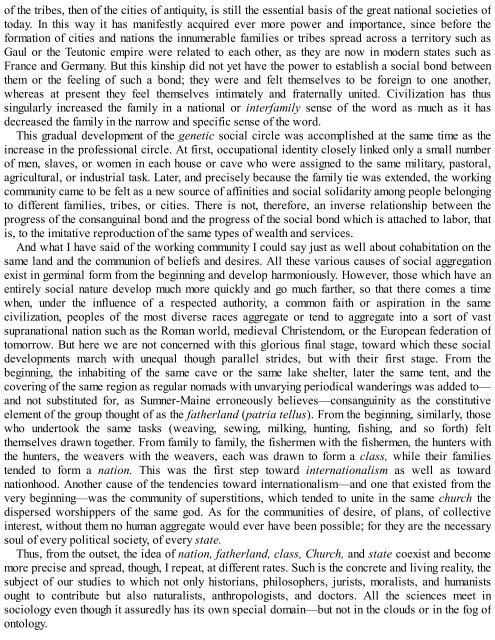3658925934
You also want an ePaper? Increase the reach of your titles
YUMPU automatically turns print PDFs into web optimized ePapers that Google loves.
of the tribes, then of the cities of antiquity, is still the essential basis of the great national societies of<br />
today. In this way it has manifestly acquired ever more power and importance, since before the<br />
formation of cities and nations the innumerable families or tribes spread across a territory such as<br />
Gaul or the Teutonic empire were related to each other, as they are now in modern states such as<br />
France and Germany. But this kinship did not yet have the power to establish a social bond between<br />
them or the feeling of such a bond; they were and felt themselves to be foreign to one another,<br />
whereas at present they feel themselves intimately and fraternally united. Civilization has thus<br />
singularly increased the family in a national or interfamily sense of the word as much as it has<br />
decreased the family in the narrow and specific sense of the word.<br />
This gradual development of the genetic social circle was accomplished at the same time as the<br />
increase in the professional circle. At first, occupational identity closely linked only a small number<br />
of men, slaves, or women in each house or cave who were assigned to the same military, pastoral,<br />
agricultural, or industrial task. Later, and precisely because the family tie was extended, the working<br />
community came to be felt as a new source of affinities and social solidarity among people belonging<br />
to different families, tribes, or cities. There is not, therefore, an inverse relationship between the<br />
progress of the consanguinal bond and the progress of the social bond which is attached to labor, that<br />
is, to the imitative reproduction of the same types of wealth and services.<br />
And what I have said of the working community I could say just as well about cohabitation on the<br />
same land and the communion of beliefs and desires. All these various causes of social aggregation<br />
exist in germinal form from the beginning and develop harmoniously. However, those which have an<br />
entirely social nature develop much more quickly and go much farther, so that there comes a time<br />
when, under the influence of a respected authority, a common faith or aspiration in the same<br />
civilization, peoples of the most diverse races aggregate or tend to aggregate into a sort of vast<br />
supranational nation such as the Roman world, medieval Christendom, or the European federation of<br />
tomorrow. But here we are not concerned with this glorious final stage, toward which these social<br />
developments march with unequal though parallel strides, but with their first stage. From the<br />
beginning, the inhabiting of the same cave or the same lake shelter, later the same tent, and the<br />
covering of the same region as regular nomads with unvarying periodical wanderings was added to—<br />
and not substituted for, as Sumner-Maine erroneously believes—consanguinity as the constitutive<br />
element of the group thought of as the fatherland (patria tellus). From the beginning, similarly, those<br />
who undertook the same tasks (weaving, sewing, milking, hunting, fishing, and so forth) felt<br />
themselves drawn together. From family to family, the fishermen with the fishermen, the hunters with<br />
the hunters, the weavers with the weavers, each was drawn to form a class, while their families<br />
tended to form a nation. This was the first step toward internationalism as well as toward<br />
nationhood. Another cause of the tendencies toward internationalism—and one that existed from the<br />
very beginning—was the community of superstitions, which tended to unite in the same church the<br />
dispersed worshippers of the same god. As for the communities of desire, of plans, of collective<br />
interest, without them no human aggregate would ever have been possible; for they are the necessary<br />
soul of every political society, of every state.<br />
Thus, from the outset, the idea of nation, fatherland, class, Church, and state coexist and become<br />
more precise and spread, though, I repeat, at different rates. Such is the concrete and living reality, the<br />
subject of our studies to which not only historians, philosophers, jurists, moralists, and humanists<br />
ought to contribute but also naturalists, anthropologists, and doctors. All the sciences meet in<br />
sociology even though it assuredly has its own special domain—but not in the clouds or in the fog of<br />
ontology.









![Genki - An Integrated Course in Elementary Japanese II [Second Edition] (2011), WITH PDF BOOKMARKS!](https://img.yumpu.com/58322134/1/180x260/genki-an-integrated-course-in-elementary-japanese-ii-second-edition-2011-with-pdf-bookmarks.jpg?quality=85)
![Genki - An Integrated Course in Elementary Japanese I [Second Edition] (2011), WITH PDF BOOKMARKS!](https://img.yumpu.com/58322120/1/182x260/genki-an-integrated-course-in-elementary-japanese-i-second-edition-2011-with-pdf-bookmarks.jpg?quality=85)





